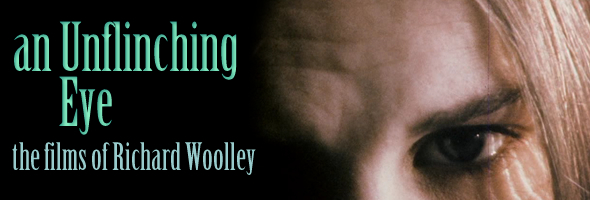
TELLING TALES
BROTHERS AND SISTERS
GIRL FROM THE SOUTH
ILLUSIVE CRIME
B&W, 1976, 50m.
Directed by Richard Woolley
Starring James Woolley, Amanda Reiss, Andrew McCulloch, Colin Proctor
B&W, 1978, 90m.
Directed by Richard Woolley
Starring Bridget Ashburn, Ian Masters, Stephen Trafford, James Woolley
Color, 1981, 96m.
Directed by Richard Woolley
Starring Carolyn Pickles, Sam Dale, Robert East, Elizabeth Bennett
Color, 1988, 84m.
Directed by Richard Woolley
Starring Mark Crowshaw, Michelle Mulvaney, Daphne Oxenford, Alan Thompson
BFI (DVD) (UK R0 PAL)
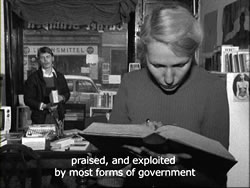 A director whose work has rarely been seen outside the UK, Richard Woolley built up a solid roster of work in both features and shorts during the '70s and '80s, often with funding in full or in part from the BFI. Their four-disc box set, entitled The Unflinching Eye, compiles all of his full-length films and many of his shorts in a chronological presentation that veers from non-narrative experimental shorts to more traditional but daring longer stories, including one of the most unusual thrillers ever made in his native country.
A director whose work has rarely been seen outside the UK, Richard Woolley built up a solid roster of work in both features and shorts during the '70s and '80s, often with funding in full or in part from the BFI. Their four-disc box set, entitled The Unflinching Eye, compiles all of his full-length films and many of his shorts in a chronological presentation that veers from non-narrative experimental shorts to more traditional but daring longer stories, including one of the most unusual thrillers ever made in his native country.
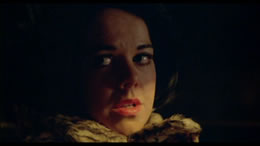 An unorthodox character study laced with speeches about gender inequality and surprising ABBA songs, Telling Tales alternates two (or three, depending how you look at it) interlinked narratives: an unhappily married couple, Mr. and Mrs. Willoughby (Donovan and Woolley), are talking of separating after their (unseen) son turns 16 and goes away to school, as she's tired of being isolated in the country and has issues with the way his business handles its union. Meanwhile their housekeeper, Sheila (Ashburn), has her own views on class equality and delivers her own thoughts straight to the camera. Mrs. Willoughby also cites a possible grounds for divorce: "Ingrid," a sick woman. In color footage (alternating with B&W for the main narrative) we see Ingrid and Paul (also played by Donovan and Woolley) as they meet and fall in love, only to encounter a nasty twist of fate. The juxtaposition of stark, distancing techniques for the breakup story contrasts with the more florid Paul and Ingrid story, which wallows in emotionalism and uses the aforementioned ABBA tunes to hyper-romantic effect.
An unorthodox character study laced with speeches about gender inequality and surprising ABBA songs, Telling Tales alternates two (or three, depending how you look at it) interlinked narratives: an unhappily married couple, Mr. and Mrs. Willoughby (Donovan and Woolley), are talking of separating after their (unseen) son turns 16 and goes away to school, as she's tired of being isolated in the country and has issues with the way his business handles its union. Meanwhile their housekeeper, Sheila (Ashburn), has her own views on class equality and delivers her own thoughts straight to the camera. Mrs. Willoughby also cites a possible grounds for divorce: "Ingrid," a sick woman. In color footage (alternating with B&W for the main narrative) we see Ingrid and Paul (also played by Donovan and Woolley) as they meet and fall in love, only to encounter a nasty twist of fate. The juxtaposition of stark, distancing techniques for the breakup story contrasts with the more florid Paul and Ingrid story, which wallows in emotionalism and uses the aforementioned ABBA tunes to hyper-romantic effect.
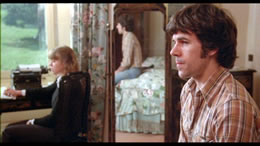 Next is perhaps Woolley's most accessible film, Brothers and Sisters, which wraps a traditional thriller concept around his usual concerns for social class and the trials facing women in modern society. The final hours of murdered prostitute Jennifer (Pickles) are intercut with the lives of the two primary suspects, a pair of brothers named James (East) and David (Dale), who are diametrically opposed politically but have no problem cheating around on their significant others and redefining sexual fidelity however they see fit. David is sleeping with both the dead woman's twin sister (also Pickles) and his girlfriend, while James avoids uncomfortable marital relations with his wife by finding women on the street. Pickles and Dale are both excellent here, and the film uses circuitous dialogue scenes to maintain tension and intrigue in an unusual way with a highly perverse final scene that left many critics banging their heads against a wall. This was also one of the earlier films scored by Trevor Jones, who later went on to the big time with The Last of the Mohicans and Cliffhanger, and his spare music here includes some startling moog effects and experimentation you'd never hear in his later work.
Next is perhaps Woolley's most accessible film, Brothers and Sisters, which wraps a traditional thriller concept around his usual concerns for social class and the trials facing women in modern society. The final hours of murdered prostitute Jennifer (Pickles) are intercut with the lives of the two primary suspects, a pair of brothers named James (East) and David (Dale), who are diametrically opposed politically but have no problem cheating around on their significant others and redefining sexual fidelity however they see fit. David is sleeping with both the dead woman's twin sister (also Pickles) and his girlfriend, while James avoids uncomfortable marital relations with his wife by finding women on the street. Pickles and Dale are both excellent here, and the film uses circuitous dialogue scenes to maintain tension and intrigue in an unusual way with a highly perverse final scene that left many critics banging their heads against a wall. This was also one of the earlier films scored by Trevor Jones, who later went on to the big time with The Last of the Mohicans and Cliffhanger, and his spare music here includes some startling moog effects and experimentation you'd never hear in his later work.
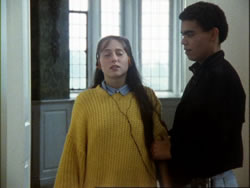 Disc four contains his final feature to date, the 1988 social drama Girl from the South. This time Woolley tosses race into the his critique of Britain's inequal treatment of its classes through the story of Anne (Mulvaney), a privileged middle-class teenager from the South of England visiting her Northern grandparents. Influenced by her fondness for romance novels about girls who falls for men from the wrong side of the tracks, she sets out on her own one day to the "bad part of town" and, though a grocery store mishap, winds up meeting and spending the day with a young black man, Ralph (Crowshaw). The two begin to fall in love, and determined to spread the wealth out a little bit, she comes up with a plan for a theft that Ralph is reluctant to encourage. Though light on actual incident until the last few minutes, the film features two effective performances from its young leads and offers an engaging commentary on the state of late '80s England; the accents can be a bit thick in this one, so the BFI's lack of optional English subtitles for this particular set may be a stumbling block for some. Also included on this disc is 1984's "Waiting for Alan," a 45-minute Woolley short with Carolyn Pickles returning as Marcia, a frustrated housewife stuck in an oppressive house while she constantly waits for her husband, Alan (Anthony Schaefer). How much can a woman take before she rebels? Pickles is superb again as she carries most of the running time on her shoulders, and while it's a very slight piece of work, it's a nice addition to close out the collection.
Disc four contains his final feature to date, the 1988 social drama Girl from the South. This time Woolley tosses race into the his critique of Britain's inequal treatment of its classes through the story of Anne (Mulvaney), a privileged middle-class teenager from the South of England visiting her Northern grandparents. Influenced by her fondness for romance novels about girls who falls for men from the wrong side of the tracks, she sets out on her own one day to the "bad part of town" and, though a grocery store mishap, winds up meeting and spending the day with a young black man, Ralph (Crowshaw). The two begin to fall in love, and determined to spread the wealth out a little bit, she comes up with a plan for a theft that Ralph is reluctant to encourage. Though light on actual incident until the last few minutes, the film features two effective performances from its young leads and offers an engaging commentary on the state of late '80s England; the accents can be a bit thick in this one, so the BFI's lack of optional English subtitles for this particular set may be a stumbling block for some. Also included on this disc is 1984's "Waiting for Alan," a 45-minute Woolley short with Carolyn Pickles returning as Marcia, a frustrated housewife stuck in an oppressive house while she constantly waits for her husband, Alan (Anthony Schaefer). How much can a woman take before she rebels? Pickles is superb again as she carries most of the running time on her shoulders, and while it's a very slight piece of work, it's a nice addition to close out the collection.